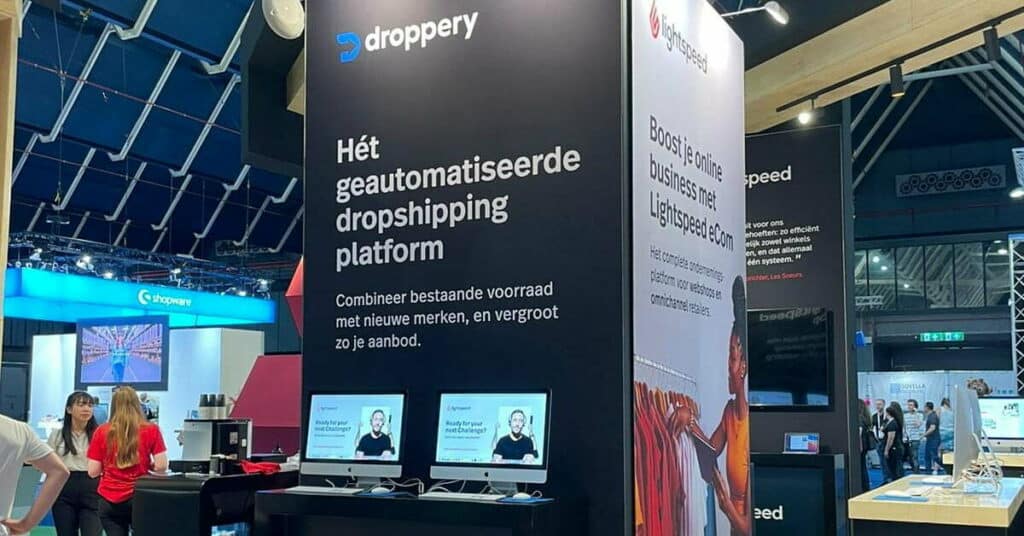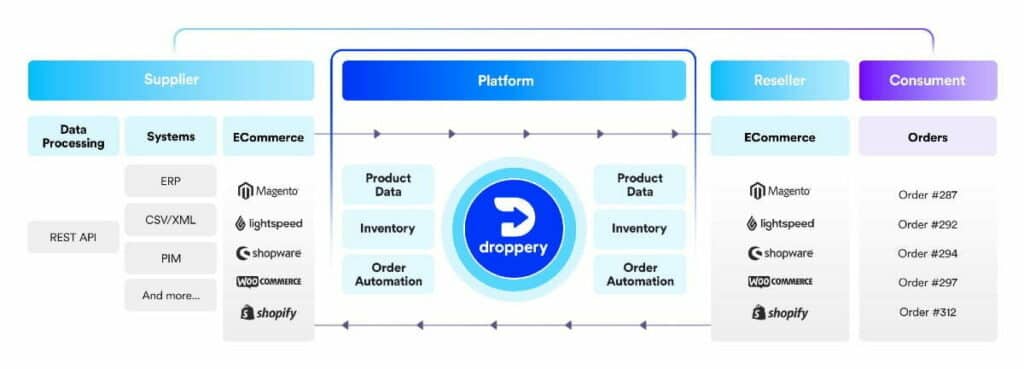One of the biggest realisations for business from the pandemic is how inadequately equipped they were to tackle the change in consumer buying patterns. As customers buy varied goods and products from different retail places, including importing from outside their own country, businesses like webshops became less relevant to them. Can you change this scenario and offer webshops a fresh lease of life?
Amsterdam-based Droppery wants to do that by allowing webshops to equip themselves with the range and variety of products that consumers are looking for. By combining smart business automation, dropshipping, and collaboration, Droppery wants to make retailers more competitive. However, it does not stop there. The Dutch startup is also bringing value to suppliers with its focus on high-end brands/suppliers and high-end resellers.
Eliminating the stigma

Droppery is not only acting as a technical bridge between suppliers and resellers but is also eliminating the stigma associated with dropshipping. “We believe in suppliers and brands from Europe with trustworthy logistics, good quality and fair margins,” says Marco Mulder. “There are plenty of these, but not collected on a central platform yet and often not automated yet.”
Droppery sees an opportunity where a number of professional webshops want to work with suppliers looking to do business with them. Marco says these webshops have experience in the business, understand omnichannel strategy, have their own stock, and some of them even have a physical store. With Droppery, Marco and a small team have built a platform that matches these webshops with expert suppliers.
For businesses, dropshipping meant terrible quality, bad delivery times, and no guarantee. Mulder says 85% of the dropshipping orders came from outside of Europe. Now that Droppery is focussing on suppliers active in Europe and relying on dropshipping, the businesses are warming up to see the benefits.
This focus is clear when you look at the amount of resellers available to a supplier on Droppery. The supplier also gets to decide whether they would like to approve a reseller or not since there is demand from suppliers for this.
An e-commerce experience
Founded in 2021 by Marco Mulder, Droppery is young but it is layered with e-commerce experience and expertise. Mulder, founder and CEO, and Cathelijne Mooren, CCO, have years of experience in the field of online marketing and e-commerce.
During their years working in the e-commerce industry, they had the opportunity to speak to a number of brands and webshops on a daily basis. They offered them help with data migrations and custom API projects. Mulder says they also noticed the “current possibilities of dropshipping on the professional market were very limited and outdated, for both suppliers and resellers.”
He cites the use of CSV or XML files and a login portal as an option to complete dropshipping orders. They also felt that dropshipping as a model was not beneficial for suppliers.
Dropshipping, according to Mulder, creates a great opportunity for suppliers to display and sell a lot of their products by their resellers. This is in contrast to wholesale business where resellers work with a limitation in terms of budget and storage area. According to Mulder, this is an opportunity to transform dropshipping and they did that by turning to the suppliers.
Droppery now offers a fully automated dropshipping ecosystem with multiple integrations from different data sources. It connects suppliers and brands with a new reseller channel to increase their sales in different countries. With a cross border strategy, Droppery is active in 15 countries to optimise the supply chain. The suppliers, brands, and resellers on Droppery are in the business for years and focus on the top-end of the market.
Solving the problem of manual processes

Even before we get to the problem that Droppery solves, it is important to note the challenges that it overcame. With the proposition of connecting high-end brands and suppliers to experienced retailers and webshops, Mulder says they faced the challenge of finding these customers initially.
They overcame this challenge by “finding the right partnerships, developing their needs, and by focussing on a small target group to create a domino effect.” The domino effect has led to Droppery now having a good portfolio of customers and creating more value with a strong network of resellers.
As a business, Mulder says they saw many companies struggling with manual processes. “Building custom connections is expensive, takes a lot of time and isn’t scalable. In addition, we also see that customers find it difficult finding the right connections that match their expectations, especially across borders, and we ensure that we solve these problems with Droppery,” Mulder explains.
Droppery solves some of these problems by offering integrations with any datasource and the ability to connect an existing or new reseller in just five minutes. Since Droppery handles the questions, businesses need not worry about support. With a scalable sales channel and the order information being pushed automatically to a supplier, Droppery ensures that there are no errors.
Droppery is also designed as a plug and play infrastructure that can connect a store to different suppliers in one catalogue. It eliminates manual CSV/XML files by offering all product data with translations, stock information, and order data in a single overview.
Bootstrapping to success
“Dropshipping is now indispensable in the Benelux region,” says Marco Mulder. The founder of Droppery also sees the market to only grow bigger in Europe in the coming years. However, to get this started, Mulder and Mooren did not raise any funds and they funded the startup themselves.
The startup’s business model is an accessible licence fee, for both reseller and supplier. Starting from the first quarter of 2023, Mulder says they are planning to implement two more solutions to make Droppery more scalable for their customers.
The team is cognizant of the fact that they will need to raise funding to grow internationally. If they raise any additional funds, Droppery will use those funds to scale its development and expand the sales team in different regions.
Plans to disrupt e-commerce

One of the most surprising things about Droppery is that the startup is made up of only 5 people. However, armed with several freelancers, Droppery is looking to not only expand but also disrupt the e-commerce industry in all of Europe.
Droppery has set itself a goal of hiring a dedicated sales team for the DACH region. The startup is also busy setting up a customer success team and investing in development. Marco says the goal is to scale the team from 5 to between 15 and 25 people in 2023.
“We have momentum now with Droppery, it is important for us to focus on the Benelux and DACH region and finding opportunities in different markets,” says Mulder.
While Droppery is focussing on building its team and product, it also aims to disrupt the industry by always staying “two steps ahead of competitors.” With the scalable solution in place, the startup is also looking to offer sustainable solutions.
The edge for Droppery lies in the fact that it is essentially competing against platforms focussing on dropshipping, marketplace integrators, and 3PL providers. As a true believer in an omnichannel strategy, Droppery can work together with marketplace integrators and 3PL providers. With a different perspective and option to collaborate with these platforms, Droppery is in a unique place to deliver value and service for companies looking to build their D2C channel.










01
From telecom veteran to Dutch Startup Visa success: The Jignesh Dave story